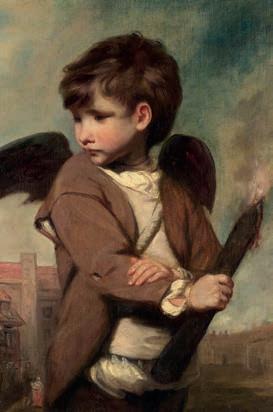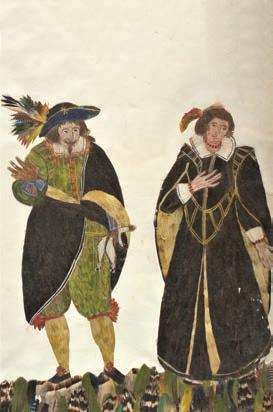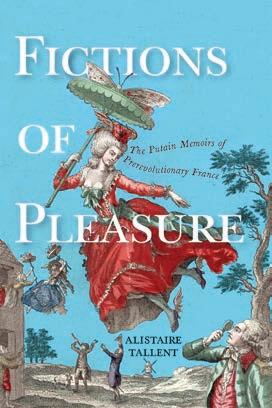
3 minute read
Writing through Boyhood in the Long Eighteenth Century

Age, Gender, and Work
CHANTEL LAVOIE
Writing through Boyhood in the Long Eighteenth Century explores how boyhood was constructed in different creative spaces that reflected the lived experience of young boys through the long eighteenth century— not simply in children’s literature but in novels, poetry, medical advice, criminal broadsides, and automaton exhibitions. The chapters encompass such rituals as breeching, learning to read and write, and going to school. They also consider the lives of boys such as chimney sweeps and convicted criminals, whose bodily labor was considered their only value and who often did not live beyond boyhood. Defined by a variety of tasks, expectations, and objectifications, boys—real, imagined, and sometimes both—were subject to the control of their elders and were used as tools in the cause of civil society, commerce, and empire. This book argues that boys in the long eighteenth century constituted a particular kind of currency, both valuable and expendable—valuable because of gender, expendable because of youth.
CHANTEL LAVOIE is an associate professor in the Department of English, Culture, and Communication at the Royal Military College of Canada. Her first monograph was Collecting Women: Poetry and Lives, 1700–1770 (2009). She has also published two collections of verse: Where the Terror Lies (2012) and This Is about Angels, Women, and Men (2021), and her first historical novel, about chimney sweeps in the eighteenth century, is forthcoming. She lives in Kingston, Ontario.
The Theatre Couple in Early Modern Italy Self-Fashioning and Mutual Marketing

SERENA LAIENA
Who were the first celebrity couples? How was their success forged? Which forces influenced their self-fashioning and marketing strategies? These questions are at the core of this study, which looks at the birth of a phenomenon, that of the couple in show business, with a focus on the promotional strategies devised by two professional performers: Giovan Battista Andreini (1576–1654) and Virginia Ramponi (1583–ca.1631). This book examines their artistic path—a deliberately crafted and mutually beneficial joint career—and links it to the historical, social, and cultural context of post-Tridentine Italy. Rooted in a broad research field, encompassing theatre history, Italian studies, celebrity studies, gender studies, and performance studies, The Theatre Couple in Early Modern Italy revises the conventional view of the Italian diva, investigates the deployment of Catholic devotion as a marketing tool, and argues for the importance of the couple system in the history of Commedia dell’Arte, a system that continues to shape celebrity today.
SERENA LAIENA is an Irish Research Council postdoctoral fellow at University College Dublin. She has published essays and articles on Commedia dell’Arte and early modern actresses. Her research interests include the social history of theatre in the sixteenth and seventeenth centuries, women’s agency in early modern Europe, and the social function of theatre today.
Performing Celebrity
240 pp 5 color and 4 b/w images
6.125 x 9.25
978-1-64453-319-2 paper $39.95S
978-1-64453-320-8 cloth $120.00SU
November 2023
Literary Studies • Gender Studies
Childhood Studies
212 pp 4 color and 4 b/w figures, 2 tables 6.125 x 9.25
978-1-64453-315-4 paper $49.95S
978-1-64453-316-1 cloth $160.00SU
December 2023
Theater • History • Literary Studies
238 pp 6 x 9
978-1-64453-323-9 paper $42.95S
978-1-64453-324-6 cloth $130.00SU
December 2023
Eighteenth-Century Studies
Literary Studies • Women’s Studies
Fictions of Pleasure

The Putain Memoirs of Prerevolutionary France
ALISTAIRE TALLENT
Out of the libertine literary tradition of eighteenth-century France emerged over a dozen memoir novels of female libertines who eagerly take up sex work as a means of escape from the patriarchal control of fathers and husbands to pursue pleasure, wealth, and personal independence outside the private, domestic sphere. In these anonymously published novels, the heroines proudly declare themselves prostitutes, or putains, and use the desire they arouse, the professional skills they develop, and the network of female friends they create to exploit, humiliate, and financially ruin wealthy and powerful men. In pursuing their desires, the putains challenge contemporary notions of womanhood and expose the injustices of ancien-régime France. Until the French Revolution spelled the end of the genre, these novels proposed not only an appealing libertine utopia in which libertine women enjoy the same benefits as their male counterparts but also entirely new ways of looking at systems of power, gender, and sexuality.
ALISTAIRE TALLENT lives in Colorado Springs, Colorado, where she is associate professor of French at Colorado College. She has published numerous book chapters and articles in such journals as Romance Review, French Forum, and Theatrum historiae
Early Modern Feminisms



